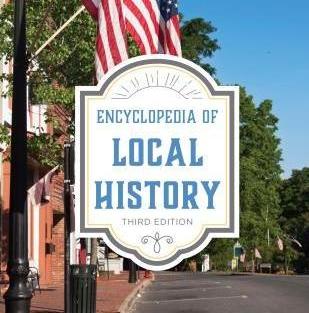UPDATED 10/11/17: The recent event in Las Vegas and the current political climate underscore how important it is for organizations to get engaged with their communities. My essay in this edition is timely in that it deals with these issues in a candid and useful way.
The Encyclopedia of Local History
Earlier this year, the eagerly awaited third edition of The Encyclopedia of Local History was completed and released by the publisher, Rowman & Littlefield, who provided this description:
“Now in its third edition, and edited by Amy H. Wilson,The Encyclopedia of Local History addresses nearly every aspect of local history, including everyday issues, theoretical approaches, and trends in the field. This encyclopedia provides both the casual browser and the dedicated historian with adept commentary by bringing the voices of over one hundred experts together in one place. Brand-new to this edition are critical topics covering both the practice of and major current areas of research in local history such as “Digitization,” “LGBT History,” museum theater,” and “STEM education.” Also new to this edition are graphics, including 48 photographs.
“Overseen by a blue-ribbon Editorial Advisory Board (Anne W. Ackerson, James D. Folts, Tim Grove, Carol Kammen, and Max A. van Balgooy) this essential reference will be frequently consulted in academic libraries with American and Canadian history programs, public libraries supporting local history, museums, historic sites and houses, and local archives in the U.S. and Canada.
“Rowman & Littlefield, in partnership with the American Association for State and Local History (AASLH), publishes technical and professional information for those who practice and support history, and addresses issues critical to the field of state and local history. AASLH provides leadership, service, and support for its members who preserve and interpret state and local history in order to make the past more meaningful in American Society.”
As best practices and perspectives continue to evolve, the comprehensive Encyclopedia of Local History should be on the shelves of every museum professional and historian. To get you started, I am sharing an excerpt from my essay, which appears below. (You can also read my entire essay by clicking on the highlighted link below.)
Building Bridges through Local History
by George McDaniel
How can local history organizations be seen by their community and our nation not just as a nicety but as a necessity? How can they move from just surviving to thriving? Across the nation, local history organizations are striving to answer such questions. There are no easy answers, no one template to take off the shelf.
One way for local history organizations to answer such questions is to do a candid assessment of itself, and then, if necessary, summon the courage and devise a process that leads them to adopt a vision less insular and more inclusive and to change themselves in systematic ways. This is not easy, thus the call for courage, for such a vision may call for them to modify their boards, their staff, their donor profiles, and their programs and outreach. Instead of acting by themselves, they may find themselves needing to partner with one another, with other professionals and professional associations, or with different and even new constituencies. Such changes will call for them to recognize, if they have not already, that the history they research, preserve, and present is not “my” history but “our” history and will lead them to infuse such a vision into all of their work.
To be sure, there are differences among us in race, gender, economic status, ethnicity, religion, age, or other factors, so our history is indeed different, but living in the same historic place or town, state or nation, we still have a shared history — a history that can bind us together and help us understand one another more fully. The organization will need leadership, both on its staff and board, that believes this and can articulate this — not as sound bites, but from their heart. They can explain in simple terms how local history can help us both empathize with those different from us and also appreciate how we are all similar. They understand that most people or groups do not want to be homogenized. They value their distinctiveness. At the same time, these leaders and their organizations understand that the valuing of distinctiveness, if overdone, can lead to insularity, prejudice, and fear. So a key question for historical organizations today is: How can they find ways to be realistic and diplomatic with their audiences and balance distinctiveness and commonality?
By becoming intentionally engaged in this question, organizations will no doubt find themselves becoming more engaged in dialogue and changing their public programs, school programs, exhibits, and community and professional communications — on site, off site, and on line. They may also see that the public, key decision-makers, and funders see them in a new light and respond with enhanced support.
“Historic sites too can become places for ‘public curation,’ or ‘public dialogue,’ places where people whose ancestors were once entrapped by prejudice and locked in conflict and/or accommodation with one another can come together and discuss how their shared, albeit different, histories have shaped their lives and how they hope to build on the past to create a brighter future.” – George W. McDaniel.
Click here to read the entire essay.
To order your hardcover edition or ebook, please visit Rowman & Littlefield.
 George W. McDaniel, Ph.D., is President of McDaniel Consulting, LLC, a strategy firm that helps organizations use history to build bridges within itself and to its broader constituents. The company’s tag line, “Building Bridges through History,” is grounded in McDaniel’s personal beliefs and his experience in site management, preservation, education, board development, fundraising, and community outreach. Rather than using history to divide us, he strives to help organizations use history, especially local history, to enhance cross-cultural understanding and to support local museums, preservation, and education. Dr. McDaniel recently led volunteer efforts with Emanuel AME Church and historical organizations in Charleston to use historic preservation to enhance racial reconciliation and healing.
George W. McDaniel, Ph.D., is President of McDaniel Consulting, LLC, a strategy firm that helps organizations use history to build bridges within itself and to its broader constituents. The company’s tag line, “Building Bridges through History,” is grounded in McDaniel’s personal beliefs and his experience in site management, preservation, education, board development, fundraising, and community outreach. Rather than using history to divide us, he strives to help organizations use history, especially local history, to enhance cross-cultural understanding and to support local museums, preservation, and education. Dr. McDaniel recently led volunteer efforts with Emanuel AME Church and historical organizations in Charleston to use historic preservation to enhance racial reconciliation and healing.
McDaniel is also the Executive Director Emeritus of Drayton Hall, a historic site in Charleston, SC, owned by the National Trust for Historic Preservation. He retired from Drayton Hall in 2015 after 25 years of distinguished service.

 McDaniel Consulting LLC is a strategy firm that helps organizations use history to build bridges within itself and its broader constituents.
McDaniel Consulting LLC is a strategy firm that helps organizations use history to build bridges within itself and its broader constituents.